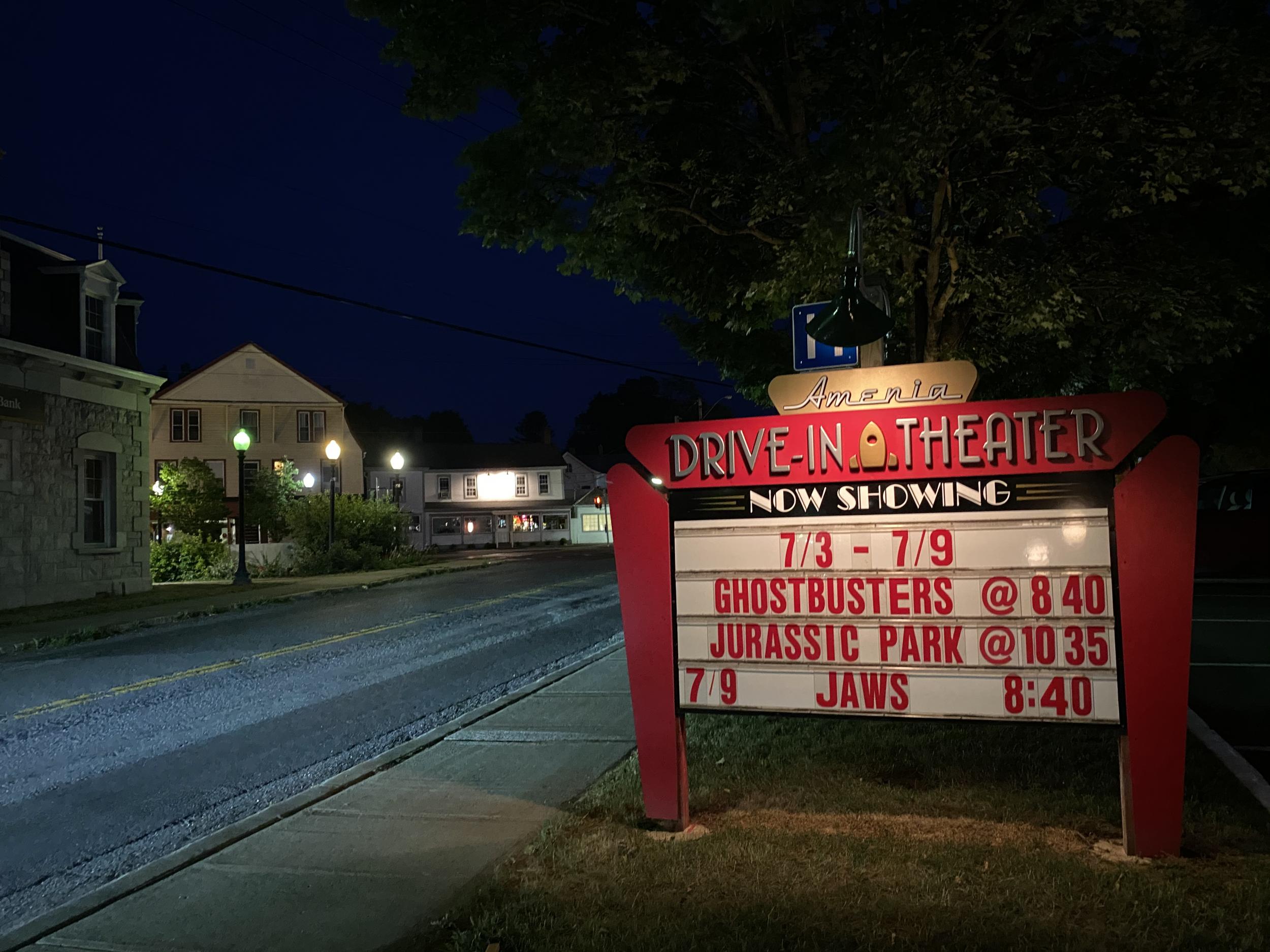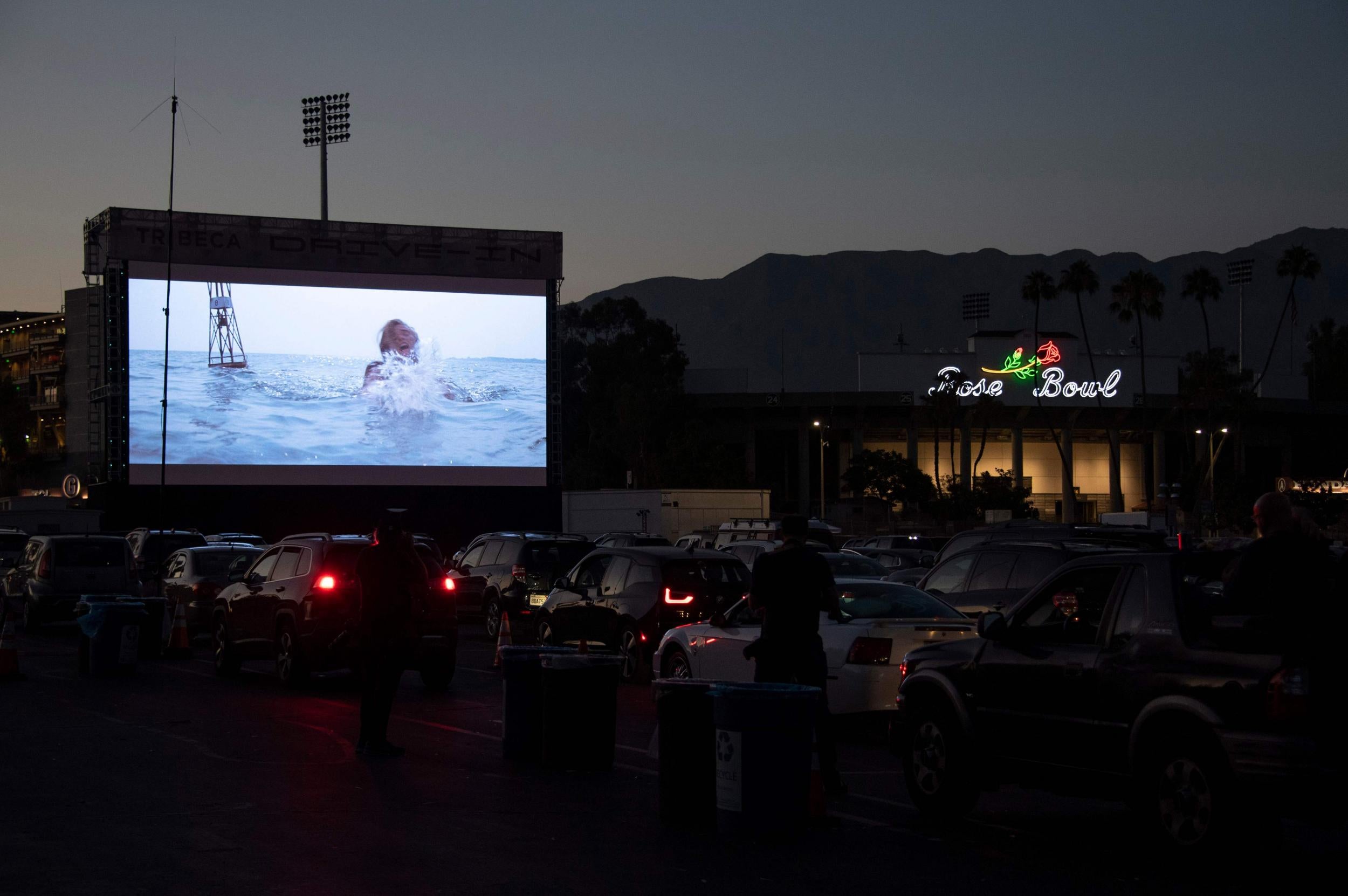‘An American renaissance’: Coronavirus ushers in revival for drive-in cinemas
Will the pandemic help Americans fall back in love with the drive-in? Richard Hall reports from Amenia, New York.

Your support helps us to tell the story
From reproductive rights to climate change to Big Tech, The Independent is on the ground when the story is developing. Whether it's investigating the financials of Elon Musk's pro-Trump PAC or producing our latest documentary, 'The A Word', which shines a light on the American women fighting for reproductive rights, we know how important it is to parse out the facts from the messaging.
At such a critical moment in US history, we need reporters on the ground. Your donation allows us to keep sending journalists to speak to both sides of the story.
The Independent is trusted by Americans across the entire political spectrum. And unlike many other quality news outlets, we choose not to lock Americans out of our reporting and analysis with paywalls. We believe quality journalism should be available to everyone, paid for by those who can afford it.
Your support makes all the difference.As dusk draws in over the small town of Amenia, a giant screen flickers to life and illuminates rows of cars in the field below. People are scattered in and around their vehicles: some on the roof, in the trunk and the hood, others on blankets in front. Mosquitoes dart back and forth as the opening credits roll.
The coronavirus has closed cinemas, shuttered studios and cancelled summer blockbusters, but none of that has stopped people from going to the movies. The drive-in cinema, a once-revered staple of American culture, is witnessing a revival.
“In the beginning part of the virus we were shut down for two months. That was super tough. But when we came out of it, there was a big influx of business,” says John Stefanapolous, one of the owners of the Four Brothers Drive-in, in Amenia, upstate New York.
While businesses around the country are struggling to adapt to new working environments brought about by the pandemic, the drive-in is ready-made for social distancing.
At this cinema, movie-goers park at least six feet from each other and can refrain from wearing a mask when they are inside their car. Their food is brought to their door.
“It’s a safe and responsible [place] for people to come out. You’re in the confines of your vehicle most of the time, when you’re out you’re wearing a mask,” he adds.
Even with a reduced capacity — a requirement for reopening their businesses during the pandemic — the family-owned Four Brothers Drive-in says it has seen a 50 per cent increase in customers since it reopened two months ago.
They aren’t the only ones. Retail giant Walmart announced its intention to transform 160 of its car parks into drive-in theatres next month in a partnership with Robert De Niro’s media company Tribeca Enterprises. Drive-in ticket sales are reportedly booming in South Korea and Germany, too.
At a time when almost all public entertainment has been cancelled or postponed, the patrons who made their way to Amenia on this balmy summer night were just grateful for the stimulation.

“I think just being out and feeling a bit like you’re in a community is a good thing, but also you can just go into a car if you need a little space from people,” says Allison O’Shea, a 35-year-old who works in the film industry and set up on the hood of her car in the front row with her partner John, also a filmmaker.
“This still has a community element that you’re all together, experiencing the same movie at the same time,” he says. “We’ve done Zoom movie watching and it’s not the same.
“[The drive-in] is kind of a temporary solution, but it’s also something that I could see myself doing a couple of times a year.”
The owners of outdoor cinemas, in their ever-dwindling numbers, are hoping the current boom is not just a fad. But can they make Americans fall in love with the drive-in once again?
The first drive-in cinema was built in 1933, in Camden, New Jersey. Over the next 30 years their numbers exploded, reaching a peak of 4,000 across the country in the late 1950s, according to the United Drive-in Theatre Owners Association (UDITOA).
The drive-in became a staple of weekend entertainment throughout the 50s and 60s, and the site of many fabled teenage romances.
A combination of factors conspired to pull people away from drive-ins over the next few decades: The invention of giant multiplexes, the VCR and other home entertainment options, and rising land costs, which made selling property for development more profitable.
There are just over 300 drive-in theatres across the United States today, according to the UDITOA — 100 fewer than there were 15 years ago. New York and Pennsylvania share top spot with 28 each.

For many, the drive-in is still synonymous with their 1950s Americana peak. The Four Brothers Drive-in is steeped in memorabilia from that era: neon signs light up the concession stand, vintage motorbikes and cars are used for decoration, even the food they serve is classic Americana.
The movies, too, at least tonight, are decades-old. On the bill this evening are Ghostbusters and Jurassic Park. That is partly by design: older movies are cheaper to screen than newly released films, and the profit margins for outdoor theatres are generally much lower than indoor cinemas, which can have multiple screens. Another reason is that Hollywood has stalled the release of most movies during the pandemic.
"Speaking from being in the profession, the well is drying up,” says Ms O’Shea. “Some places are holding on to movies because they don’t want to release them when there is not an audience.”
But, she adds, that only adds to the nostalgia of it all.
“Half these kids probably haven’t seen Ghostbusters or Jurassic Park, but it’s my hundredth time.”
The Four Brothers Drive-in may deal heavily in that nostalgia, but they boast of being the newest such cinema in the country, starting from scratch just seven years ago. They staked their money on being able to attract a new generation of outdoor movie fans.
“[The revival] was happening already, the coronavirus just sped it up,” says Mr Stefanapolous, who runs the cinema with his brother John.
“We felt this renaissance happening. Mainstream America coming back, looking for more boutique spaces, moving away from the mall society,” he adds.
John, the filmmaker, can see the appeal.
“With [the rise of] Netflix and streaming services, actually going to a movie becomes much more of an event. The drive-in is definitely one of those things. Actually watching the movie isn’t necessarily what it’s about,” he says.
Join our commenting forum
Join thought-provoking conversations, follow other Independent readers and see their replies
Comments